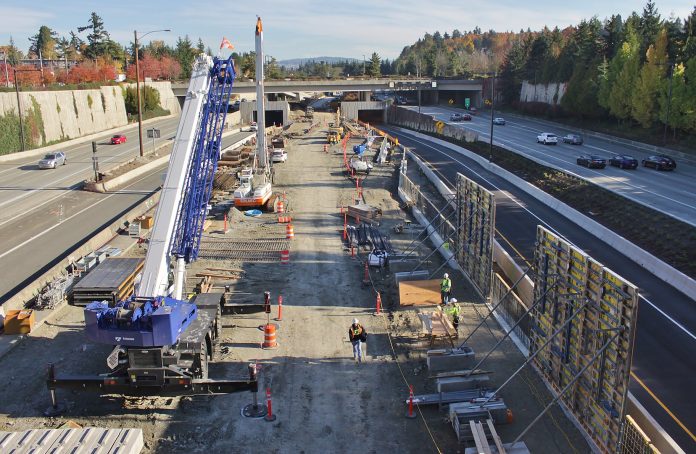A new state bill would slash more than $1 billion in Sound Transit revenues in order to satisfy a minority of anti-tax voters in the Sound Transit taxing district. The bill comes on the heels of statewide passage of Initiative 976 in November, which would curtail fees and taxes on vehicles. The initiative specifically targets the motor vehicle excise tax used to fund Sound Transit projects, which is currently on hold pending litigation to determine the constitutionality of the measure.
Senate Bill 6606, for its part, is designed to target the motor vehicle excise tax in order to reduce later-year tax rates of older vehicles and require Sound Transit to use the 2006 depreciation schedule now instead of converting to it in 2028. The bill does not identify funding to backfill those cuts, jeopardizing Sound Transit’s project delivery schedule.
Proposed by Democrats, SB 6606 would be a $2.9 billion hit to the voter-approved Sound Transit 3 (ST3) budget factoring in higher borrowing costs, a Sound Transit spokesperson said. This is especially problematic given that the financial hit would come when financing needs are greatest. After all, in the next few years the agency is attempting to wrap up Sound Transit 2 projects as it begins rolling out a bevy of ST3 projects.
Right now, the motor vehicle excise tax used by Sound Transit is subject to the 1996 depreciation schedule in valuing vehicles. But that is slated to change to the 2006 version eight years from now. The 1996 version means that vehicles are generally valued a little higher than the 2006 schedule and provides more revenue for Sound Transit projects. But anti-tax constituents have long complained about the motor vehicle excise tax with some raising subjective issues of “fair” valuations.
The Democrats’ bill is worded to go into effect if and when the courts end the injunction blocking I-976 and rule the $30 car tab initiative can go into effect, or in legalese “when I-976 is no longer enjoined from effectiveness.” It is not clear what would happen if the courts end up striking down I-976 as unconstitutional permanently.
Assuming courts do not strike down the initiative, SB 6606 would then repeal several parts of I-976 dealing with Sound Transit and the motor vehicle excise tax statutes. This would require two-thirds of the state legislature to approve the bill since it would be amending an initiative, meaning that it would need Republican support, too. That seems unlikely since Republicans refused to join Democrats on their previous failed car tab cutting bills, preferring instead their own more extreme alternatives with deeper cuts. Moreover, Republicans would likely prefer to keep the more draconian and devastating original I-976 version in place since they generally backed it in the first place. The bill has no Republican sponsors.
State Senator Marko Liias (D-Edmonds) commented on a tweet by The Urbanist last week in reference to SB 6606 stating the bill “responds to the request of the Sound Transit board that the Legislature approve a more fair method vehicle valuation.” While the statement may technically be true, it is incomplete and misleading about what the Sound Transit Board of Directors has consistently requested. The board has maintained that legislative changes to the motor vehicle excise tax should ensure that Sound Transit remains financially whole. The proposed bill would not achieve that as currently drafted since it contains no new revenue options or ways to reduce project costs.
Geoff Patrick, a Sound Transit spokesperson on legislative matters, affirmed these problems with the bill.
“Sound Transit Board’s legislative agenda adopted in December directs staff to continue work with the Legislature to address the vehicle depreciation issue in a ‘revenue neutral manner’ in order to not impact the completion of projects approved by regional voters,” he said in a written statement. “This bill does not meet that request of the Board in that it lacks offsets for the projected $1.024 billion reduction in revenue, which would have an approximately $2.911 billion impact through 2041 after costs of increased borrowing are factored in.”
The funding shortfall is enormous and continues the state legislature’s track record of coming up with bills that do not pay for their costs to the ST3 program in reducing fees and taxes. The proposed bill is particularly cynical to the will of Sound Transit taxing district voters. In November, those voters rejected I-976 by about the same amount as voters passed ST3 in 2016, which is a clear indication the Sound Transit taxing district voters still support ST3, oppose delays, and are willing to pay higher motor vehicle excise tax rates to prevent them. Yet, the bill crafted by Democrats would do the opposite–and Democratic Senators Liias, Mark Mullet, Steve Hobbs, Manka Dhingra, Patty Kuderer, Steve Conway, Jeannie Darneille, Karen Keiser, Claire Wilson, John McCoy, Mona Das, Andy Billig, Rebecca Saldaña, and Derek Stanford have all signed on as sponsors.
Ultimately, Democrats should listen to voters by rejecting the bill or making Sound Transit whole by allocating new revenue to bridge the difference.
Editor’s Note: An earlier version incorrectly identified State Senator Lynda Wilson (R-Vancouver) as a sponsor in place of State Senator Claire Wilson (D-Auburn). Also note that State Senator Saldaña (D-Seattle) has since indicated she opposes the transit funding cuts but hopes to use her sponsor status to influence improvements to the bill.
Stephen is a professional urban planner in Puget Sound with a passion for sustainable, livable, and diverse cities. He is especially interested in how policies, regulations, and programs can promote positive outcomes for communities. With stints in great cities like Bellingham and Cork, Stephen currently lives in Seattle. He primarily covers land use and transportation issues and has been with The Urbanist since 2014.



